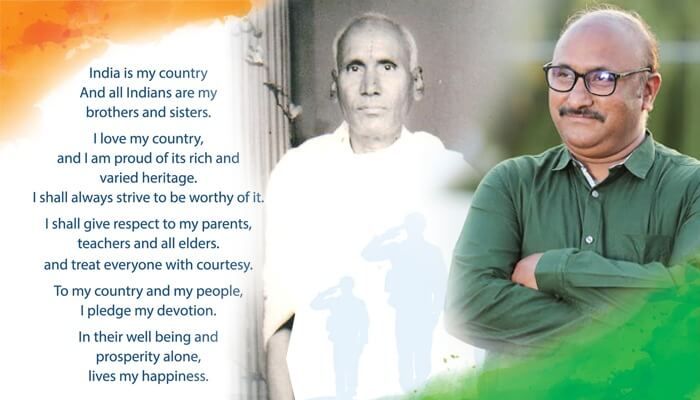What does the antiquity of India’s National Pledge have to do with a technical blog by a technology institute? Read on as we connect the dots between the eminent Telangana poet Paidimarri Venkata Subba Rao, the National Pledge and IIIT Hyderabad.
When Vice-President Venkaiah Naidu asked Indians to renew their allegiance to the National Pledge, it spotlighted the timeless legacy of Telangana poet P V Subba Rao. The great author was unaware that his inspiring words in Telugu, written at the height of the Chinese Aggression, was adopted as the National Pledge in 1963. Two decades later, long after he had retired from an illustrious career as Treasury Officer, he overheard his granddaughter Durga Rani practicing the Pledge for school assembly. Imagine his astonishment when he realized that his words, written 26 years back, was a national symbol!
His youngest son, Paidimarri Venkata Subba Rambabu is one of IIIT Hyderabad’s most cherished officials and the go-to man on campus, fondly regarded as an encyclopedia on all IIITH-related matters. Whether it is organizing LTRC’s flagship international conference or helping overseas-bound students through the maze of visa and embassy protocol, the ubiquitous Rambabu is always the enabler, ever ready to help out.
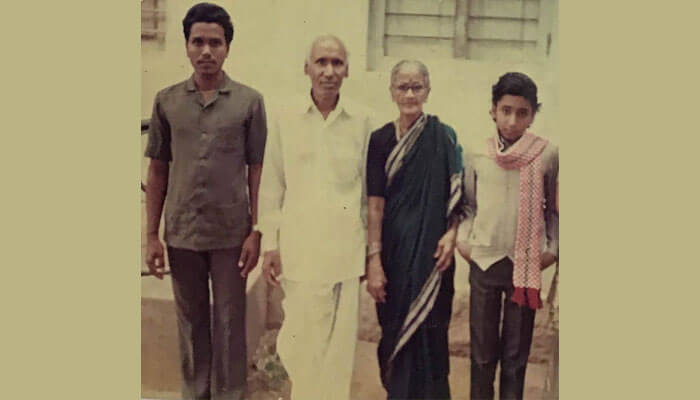
When the pen was mightier than the sword
P.V Subba Rao was posted as the Treasury Officer of Visakhapatnam district during 1st Indo-China conflict in 1962. In response to a call by senior leader Tenneti Viswanatham to the literary community, the poet wrote a small inspiring paragraph that captured the much-needed patriotic fervor. So impressed was Tenneti Viswanatham that he passed the script on to then State Education Minister, Raja Saheb of Vizianagaram P.V.G Raju. P.V Subba Rao was shortly transferred to Nellore and forgot about the issue.
Unbeknownst to him, the Education minister had directed all schools of Vishakhapatnam to take the pledge in 1963. In time, the pledge came to the attention of the Union Education Minister M. C. Chagla who had it translated into all the official languages and enshrined as the National Pledge on 26 January 1965.
A son of the Nalgonda soil
Born in 1916 at Annaparthi village in Nalgonda district, P V Subba Rao lost his father at the tender age of 10. His widowed mother brought up her family by selling off small parcels of the large estate of his father, a contractor in the Nizam’s state. He completed his 10th standard from an Urdu medium school and joined employment as assistant clerk in the Nizam State Treasury department at Nalgonda. With a flair for languages, he could read and write English, Telugu, Sanskrit, Hindi, Urdu and Arabic. He was known for his vast experience, honesty and range of knowledge and rose up the ranks to retire as District Treasury Officer.
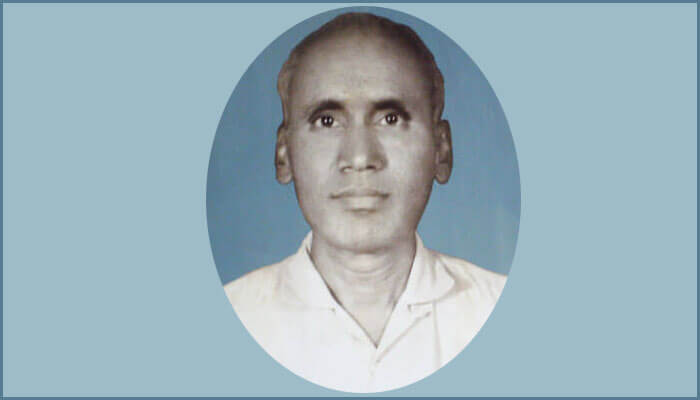
Subba Rao started writing at the age of 18. At 21, his verses were published in Golconda Kavala Charitra, an anthology of poems. He went on to author several books in Telugu including the popular Kalabhairavudu and Dhowthi – Nouli. He translated notable works in English, Hindi, Arabic and Urdu on naturopathy, homeopathy, Ayurveda as well as the Geeta Bhashyam and the Patanjali Yoga Pradipka into Telugu. He wrote inspiring literature on social issues and the struggles of the common man that were published in major newspapers and literary journals like ‘Palleturu’. With every posting, his wide social network was enriched as he joined literary societies in Vishakhapatnam, Nizamabad, Nellore and Nalgonda.
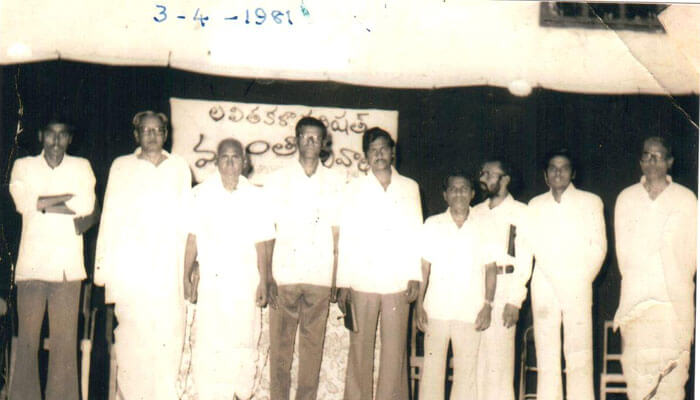
P V Subba Rao would fill lots of notebooks with his writing, most of which are unpublished. The Telangana government was recently approached by the family to publish the manuscripts.
Married at the age of 21 to Venkata Ratnamma, the couple had two sons and 2 daughters, the youngest being Rambabu who was born a few days before the author retired at the age of 55. Rambabu observes that his father was a very simple and disciplined man, a follower of Ramakrishna Paramahamsa, Vivekananda and Sri Ramana Maharshi, with a deep personal philosophy and a high sense of social responsibility. He had a large private library of books on a variety of subjects including history, naturopathy, ayurveda and homeopathy in several languages. Well versed in ayurveda and homeopathy, he would find time to practice the ancient medicine at home and dispense free medication for the community. In later years, he would persevere and complete his B.A. “I don’t know how he was able to achieve so much in life,” muses his son. P V Subba Rao expired on 13 Aug 1988 at the age of 73 after a short illness.
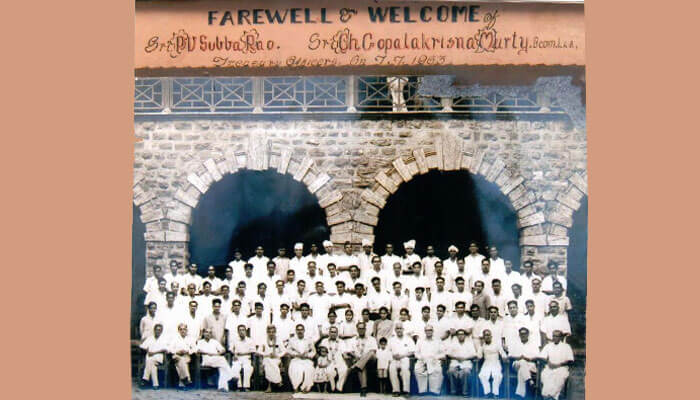
On the shoulders of a giant
In 1987, Rambabu had completed his Class 10 from Nalgonda and it was an enormous personal loss for the youngster when his father expired shortly afterwards. After completing his B.Com, he was pursuing the 2nd year of his law degree when he came to Hyderabad in November 1995 to explore his career options. Through a well-wisher of his father, the 24-year-old would meet Mr. Parameshwar, who was working at the University of Hyderabad (UoH). With his assistance, Rambabu joined the University and was fortuitous to meet Prof. Rajeev Sangal, a project head who went on to become one of the first full-time directors of IIITH. “We moved to IIITH on 1 October 1999 and I have been here since then”, said Rambabu who completed his LLB and later his MBA in 2007.
“In the early days of IIITH, though the work load was immense, we enjoyed our work as our life mission. When I joined, I only knew typing. It was a big opportunity for me to learn from the likes of Prof. Sangal, Prof. Vineet Chaitanya, Prof. Amba Kulkarni, Prof. Dipti M Sharma, Prof. Udaya Narayana Singh (UoH), Prof. G U Rao (UoH), Prof. P J Narayanan and Prof. Vasudeva Varma who groomed me on business correspondence and soft skills around the office”, he remarks.
The learning fields of IIITH
Rambabu gained a rich range of experience, starting from the Directors’ office and the Admissions office, moving through the other research centers to his present role as Manager of the R&D department. Says Prof. Vasudeva Varma who has known him from his 1992 days as a PhD student, “There was always an impression that if you give something to Rambabu, it will be taken care of. He plays a key role in running the international conference on natural language processing (ICON) around India, making life easy for the organizers”.
Rambabu and his wife Durga Rani (you met her earlier as PV Subba Rao’s granddaughter) have two daughters; Sai Mahathi and Sai Pashyanthi. Tragedy struck when Sai Pashyanthi suffered bilateral sensorineural hearing loss, caused by an adverse drug reaction, when she was 7 years old. Over the years, his wife would spend a lot of time and energy on her daughter’s treatment. Then in September 2020, the family was told that a cochlear implant surgery was imperative to stem the alarming decline.
Rambabu approached Prof. Sangal, Prof. Vasudeva Varma, Prof. Dipti Sharma and Ms. Meenakshi Vishwanathan. On Prof. Varma’s recommendation, a mail was broadcast on twitter and other college fora. The whole IIITH community responded instantly with financial aid and moral support and the immediate requirement was met.
It is a long road ahead for the youngster and funding will be required at regular intervals. But what amazed Rambabu was the groundswell of assistance that people from all walks of life offered them, during the height of the pandemic.
Today, Sai Pashyanthi is doing her Intermediate 2nd year and aspires to specialize in audiology while her elder sister Sai Mahathi is in her 4th year of B. Tech.
“It doesn’t matter how many problems Rambabu has personally, he never allows it to reflect on his professional duties”, observes Prof. Varma. Thus, when his daughter required an expensive surgery, the IIITH community saw it as an opportunity to pay something back to the generous and ever-helpful Rambabu.
Acts of kindness and goodwill that P.V. Subba Rao, P.V.S. Rambabu and his forefathers had sowed over generations had come back a full circle to help the Paidimarri family in their darkest hour.

